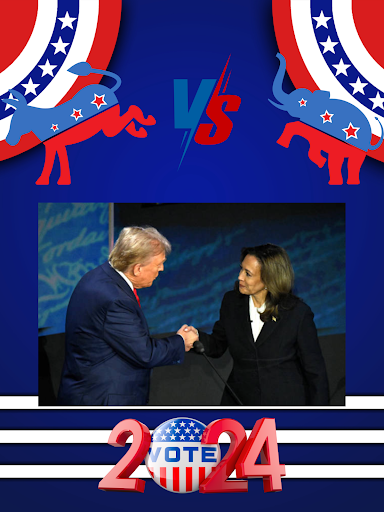The impeachment trial
Just about five miles away from the school, for the third time in history, the U.S. president has been impeached, though not removed from office. On December 18, the House of Representatives voted to bring impeachment charges against the president, Donald J. Trump. On February 5, the Senate acquitted him of these charges, bringing the five-month process to its anticipated end.
“We’re right there in the belly of this whole thing so lots of people follow it [impeachment], and we think it’s very important,” Mr. Les Albers, who teaches International Baccalaureate (IB) History of the Americas, U.S. history, and economics and personal finance, said. “When you talk to people like my daughter out in Illinois, it’s not so important; they’ve got their own issues there.”
An anonymous whistleblower’s complaint about a phone call between Trump and Ukranian president Volodymyr Zelensky sparked the impeachment inquiry. Trump began the call by congratulating Zelensky on his recent election victory, then shifted the conversation by alluding to U.S. military assistance toward Ukraine, which was frozen at the time. He followed this by pushing Zelensky to launch an investigation into Trump’s political rival former Vice President Joe Biden, his son Hunter Biden and Burisma, the Ukranian gas company whose board Hunter Biden served on. Trump also urged Zelensky to investigate a theory that the Ukranian government conspired with Democrats to interfere in the 2016 election.
The framers of the Constitution listed treason, bribery or other high crimes and misdemeanors as impeachable offenses. The flexibility of these terms leaves a lot open to interpretation, leading to debate over whether Trump’s actions were impeachable.
“Facts can be put in different contexts by different people,” Dr. Margaret East, who teaches Advanced Placement (AP) U.S. Government, IB Geography, and economics and personal finance, said. “There’s one fact: there was a phone call, but people couch that context and construe that context. I think a lot of Republicans were supporting Trump—not just because it was Trump—I think a lot of those people legitimately had constitutional concerns about the reason why impeachment was happening.”
Dr. East continued, “There’s a difference in opinion about what a president should be able to do. That goes back to interpreting what the Constitution allows. A lot of Republicans tend to be more strict interpretationists of the Constitution. If they read Article II they see that the president is given so much power over so many things, so they were not legitimately concerned about some of the things that he was doing that were concerning Democrats.”
While Republicans argue Trump’s actions don’t constitute impeachment, Democrats believe the Ukraine scandal is only the tip of the iceberg and that this type of behavior deserves consequences.
“Trump has committed an uncountable number of crimes and abuses of power from the very start, like the fact that he’s using the office of the presidency to direct millions of dollars to his hotel business,” Mr. Kevin Philips, who teaches AP U.S. Government and AP Psychology, said. “He didn’t divest from his business like he said he was going to. He’s hired his own kids to do these jobs in the White House, even though they were supposed to be doing business, and they still are. He put kids in cages. He misused and misappropriated funds for the border wall. He directed people not to testify for a congressional investigation. He’s impeached on this thing with Ukraine, which is not good, it’s definitely corrupt and sketchy and an abuse of power. It’s not the worst thing he’s done.”
Despite the impeachment investigation, Trump supporters have stuck with him. The extent of the trust and confidence Trump inspires in his followers has been proven throughout his presidency.
“I think if he still has this unwavering support from his fan base, people are gonna keep making excuses for the candidates they support,” senior Abby Lewis said. “It’s less gonna be like the president is this unifying figure that leads the nation, it’s gonna be more like 50 percent of the country likes him and 50 percent of the country doesn’t like him. Whatever he does, the side that likes him is gonna keep liking him. It’s gonna be harder for people to agree on what’s wrong and what’s right.”
A Gallup poll taken in the midst of the Senate impeachment trial showed Trump’s approval rating at 49 percent—the highest it’s ever been. Mr. Philips attributes this to how the Democrats conducted and presented their argument.
“They knew that he was going to be found innocent—that it [impeachment] was always a pipe dream,” Mr. Philips said. “They narrowed it down way too much. They debated whether to include the bribery aspect, which I think would have actually made sense to people. Somehow they took it from he’s trying to rig the 2020 election by using his powers as president to investigate his opponents to caring about Ukraine military aid. Americans don’t care about that, it’s not interesting to them. It’s different from the Bill Clinton thing, but that was about sex—people are interested in that. That’s why Republicans did it, they knew people would pay attention, because who can look away from that?”
Impeachment did little to shift voter opinion on the president; apathy on the subject can help explain why Trump’s approval rating has increased. In fact, Dr. East, who discussed impeachment with her government classes, said she noticed some of her students held opinions on impeachment without understanding all of the details.
“A lot of people in my classes are very solidly liberal, so they were pretty happy that impeachment articles were beginning,” Dr. East said. “In a lot of ways they were happy without understanding why they were happy, because they were just hearing ‘orange man bad’ or ‘Trump bad.’ That’s what they hear from a lot of their friends, but they can’t tell me or articulate why. So over the course of the year they either get better at articulating that or they sometimes change their minds about things.”
Many of the government teachers chose to discuss the impeachment trial with their classes. Lewis, who was in favor of impeachment proceedings, attributed a lot of her understanding of the subject to her class.
“We’re going over it [impeachment] in my government class, so that’s kind of the main reason [I understand what’s going on],” Lewis said. “[Mr. Vogel] will give a brief synopsis and I read an article, because I thought I should probably know what’s going on. So I kind of understand more of what’s going on then I would have if I wasn’t taking government.”
Although Mr. Albers, who teaches U.S. history, hasn’t yet discussed impeachment with his classes, he said he will see what comparisons they can make when they get to the Nixon presidency and then the Clinton impeachment. His classes often examine the ties between current events and history.
“Just today we talked about American imperialism, so I alluded to Afghanistan and Iraq and our presence over there to see if people could make some connections with that,” Mr. Albers said.
Comparisons to Bill Clinton are often drawn to try and determine the magnitude of what Trump has done. Bill Clinton’s Oval Office affair with White House intern Monica Lewinsky and subsequent lying about it resulted in articles of impeachment for perjury and obstruction of justice. Although Clinton was impeached, no president has been removed from office. By voting to convict Trump of abuse of power, Senator Mitt Romney became the first Senator to vote to remove a president of their own party, a historic event that revealed a lot about American politics.
“I think one of the big flaws is that the impeachment idea, like the way they set it up, was they were thinking the major conflict in government would be between branches,” Mr. Philips said. “The legislative branch will hate the executive and they’ll try to duke it out all the time. The executive branch oversteps their lines too much, and the legislative branch will then [step in]. That’s not the conflict at all, the conflict is between parties. So if one party controls a piece of the legislative and the executive branch, then they’re just not going to remove someone.”
For many politicians, their vote on impeachment will determine if they are reelected. A lot is on the line for them, some of whom must decide between their career and their morals.
“I know the Senate majority is Republicans and they’re all gonna stand by him,” Lewis said. “If they’re career Senators and they vote against him they’re not gonna get re-elected. So that’s part of it and part of it is his party stands with him.”
Mitt Romney, who is 72, is unlikely to run for office again. He and Trump have had a complicated relationship throughout the years, alternating from Trump endorsing Romney’s Senate campaign and Romney congratulating Trump on his 2016 victory to Romney criticizing Trump’s remarks about Mexican-Americans and Trump mocking Romney’s 2012 loss to former president Barack Obama. Despite personal matters, the gravity of this situation weighed on Romney. He told an Atlantic reporter that he found this to be “the most difficult decision I have ever had to make in my life.” After contemplating the evidence and leaning on his religion for guidance, he felt he had to vote to convict Trump.
“[Romney] explained that he searched his soul and determined that’s what he should do,” Mr. Albers said. “It probably goes back to when he was running against Trump in the 2016 election and feelings were bad then, and I assume he held negative views against Trump since. I’d like to think it was a difficult decision. I want all these guys to deliberate and give thoughtful decisions.”
Romney’s historical vote was not this impeachment’s only first—the vote to acquit was entirely partisan. Independents joined Democrats to vote against Trump, making this the first time no members of the opposing party voted with the president.
“I don’t think it’s enhanced our society,” Mr. Albers said. “We’re divided enough, we need to come together at some point and this [impeachment] keeps that division going.”
Dr. East agrees that partisan polarization has become an issue in this country. She believes the two parties could coexist if they took a more empathic approach.
“I always come to my class trying to inform them of something that they haven’t seen before,” Dr. East said. “I have people in my family that are Republicans. I have lived in other parts of the state. And I want [mystudents] to understand that these people aren’t the Antichrist and that they can understand their positions if they’ll just talk to each other. Of course when I go home that’s what I’m doing with my Republican family, I’m saying they’re not the Antichrist.”












